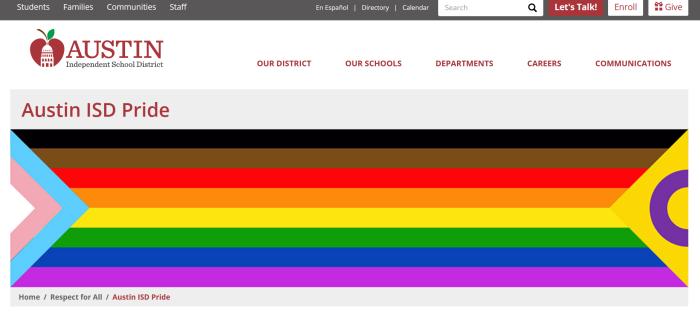Austin ISD promotes LGBT pride week events with intersex rainbow flag, 'pronoun buttons'

“Why are grown adults encouraging kids to celebrate sexuality with them?”
That’s the question one Texas pro-family group is asking after school officials in Austin, Texas, announced an LGBT “pride week” to be held later this month.
Scheduled for March 20-25, Austin ISD is planning to hand out “pronoun buttons,” rainbow flags, LGBT stickers and other trinkets to students and staff for the event, according to the district’s website.
The website page for the event — which is timed to coincide with National LGBT Health Awareness Week — features a massive, multicolored flag known as the “Intersex-Inclusive Progress Pride Flag,” which advocates for trans and intersex inclusion.
The flag is also featured on one of the stickers for the event.
While the annual pride parade will occur in August, the weeklong celebration in March will include five LGBT-themed days, culminating with a “Pride Y’all! Connect and Celebrate” event at the AISD Performing Arts Center on March 25.
There are approximately 75,000 students enrolled in the district's 13 high schools, 18 middle schools and 79 elementary schools.
The school district began hosting pride events in 2014. While the so-called pride curriculum is not mandatory, students as young as elementary school age are invited to participate.
On Feb. 23, Texas Family Project issued a “Pride Alert” notifying parents of the district’s plans and asked three questions: “Why are grown adults encouraging kids to celebrate sexuality with them? When did schools become more about gender ideology than learning ABCs and 123s? Why are taxpayers being forced to fund the indoctrination of our most impressionable and vulnerable Texans?”
The group’s statement added: “Parents: It is up to us to protect our children from the Anti-Family Left, the evil forces that align with it, and the indoctrination school administrators are pushing on our kids.”
Austin ISD chief of staff Toni Cordova and interim chief equity officer Stephanie did not respond to requests for comment from The Christian Post.
Last year, Texas Attorney General Ken Paxton sent a letter to Austin ISD officials notifying them that, in his view, such events can be categorized as “human sexuality instruction” and said parents must have a say in such events.
“The Texas Legislature has made it clear that when it comes to sex education, parents — not school districts — are in charge,” Paxton wrote.
With its progressive education policies, Austin has long stood in contrast to the state’s culturally conservative roots.
In 2019, the school board voted in favor of a new sex curriculum that teaches students about LGBT and gender identities, among other topics, a vote which one conservative group said “sends a clear message” that “people of faith and traditional moral values are not welcome in Austin ISD.”
On its website, AISD defines LGBT terms for its district staff and students and references various aspects of sexuality, including LGBT-affirming language such as "cisgender" and "queer," which, according to the page, was "originally used pejoratively against those with same-sex desires but, beginning in the late-1980s, queer scholars and activists began to reclaim the word."
The page also includes links to the CDC, GLAAD, and the Trevor Project, which features research briefs such as this one that correlates religious beliefs with higher rates of suicide among LGBT-identified people, a claim that has frequently been disputed.
Dr. Jennifer Bauwens, director of the Center for Family Studies for the Family Research Council, a nonprofit research and educational group which looks at social issues from a biblical worldview, told CP that researchers of the study cited by the Trevor Project neglected to cover a number of factors that are omitted from this particular study.
“From 2011 on, we’ve seen a rise in mental health issues amongst this population … in this study, how is that accounted for?” she said. “If these things are already rising in this cohort, then how have you accounted for that rise in this study? We don’t know.”
Bauwens also said it’s difficult to measure a highly complex idea — such as correlating religion with suicide rate — with the kinds of questions seen in this study, which was released in April 2020.
“If this is the primary focus of your study, to understand the effect that religion has on suicide, and you ask those ideas — in research we call them constructs — with one question, that’s very problematic," she explained.
“To make just a simple correlation between these two ideas that we don’t even know if they’re really connected, that’s fine if you’re just doing a research study to initially understand what’s going on, but to take that and use that to make policy or practice decisions is very irresponsible.”
Ian M. Giatti is a reporter for The Christian Post. He can be reached at: ian.giatti@christianpost.com.





























